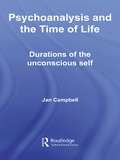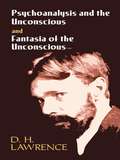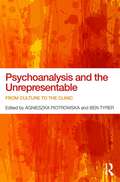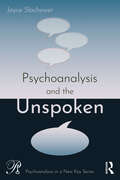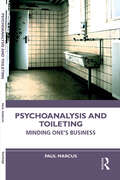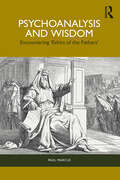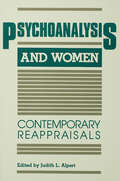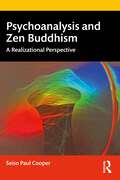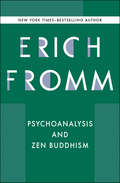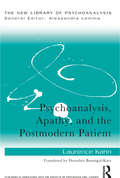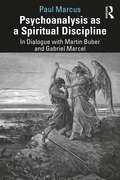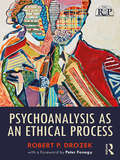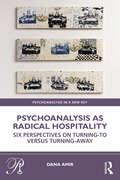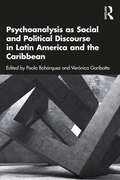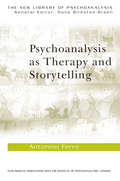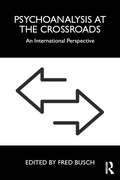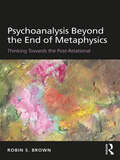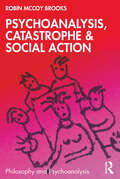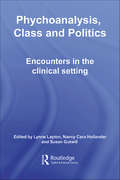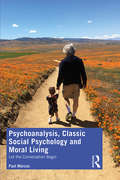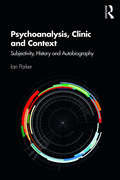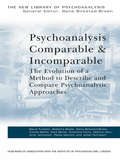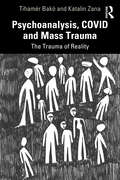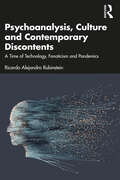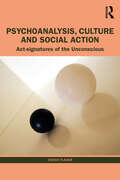- Table View
- List View
Psychoanalysis and the Time of Life: Durations of the Unconscious Self
by Jan CampbellIs psychoanalysis a narrative of self-knowledge, or a movement of lived time and the body? Psychoanalysis and the Time of Life examines the relationship between therapy and the time of life, presenting an original and thought-provoking re-reading of psychoanalysis in relation to questions of lived time. Jan Campbell investigates the early work of Freud, Janet, Breuer and Ferenczi, linking their ideas to the philosophy of Bergson. The link between psychoanalysis and the question of time connects these early debates with current issues that are central to our global society. Questions considered include: • is the unconscious based on representation or affect?• is the Oedipal Complex hysterical?• how is therapy related to the time of our life?• what is the role of hypnosis, in relation to psychoanalytic theory and transference?• Freud conceptualised the unconscious as timeless space, but what would it mean to think of the unconscious as the very essence of psychic bodily time? This book draws on the fields of traditional psychoanalysis, philosophy, neuroscience, and trauma studies providing a valuable new perspective on familiar concepts such as identity and consciousness. It will be of interest to students across the humanities and social sciences, and practicing psychoanalysts and psychoanalytic psychotherapists.
Psychoanalysis and the Unconscious and Fantasia of the Unconscious
by D. H. LawrenceThis volume features two profound essays by one of the English language's most famous and controversial authors. D. H. Lawrence wrote Psychoanalysis and the Unconscious and Fantasia of the Unconscious in the early 1920s, during his most productive period. Initially intended as a response to psychoanalytic criticism of his novel Sons and Lovers, these works progressed into a counterproposal to the Freudian psychoanalytic theory of the unconscious and the incest motive. They also voice Lawrence's concepts of education, marriage, and social and political action."This pseudo-philosophy of mine," explained Lawrence, "was deduced from the novels and poems, not the reverse. The absolute need one has for some sort of satisfactory mental attitude towards oneself and things in general makes one try to abstract some definite conclusions from one's experiences as a writer and as a man." With these two essays, the author articulates his insights into the mental struggle to rationalize and reconcile the polarity that exists between emotional and intellectual identities. Critical to understanding Lawrence's other works, they offer a bold synthesis of literary theory and criticism of Freudian psychology.
Psychoanalysis and the Unrepresentable: From culture to the clinic
by Agnieszka Piotrowska Ben TyrerPsychoanalysis and the Unrepresentable opens a space for meaningful debate about translating psychoanalytic concepts from the work of clinicians to that of academics and back again. Focusing on the idea of the unrepresentable, this collection of essays by psychoanalysts, psychotherapists, counsellors, artists and film and literary scholars attempts to think through those things that are impossible to be thought through completely. Offering a unique insight into areas like trauma studies, where it is difficult – if not impossible – to express one’s feelings, the collection draws from psychoanalysis in its broadest sense and acts as a gesture against the fixed and the frozen. Psychoanalysis and the Unrepresentable is presented in six parts: Approaching Trauma, Sense and Gesture, Impossible Poetics, Without Words, Wounds and Suture and Auto/Fiction. The chapters therein address topics including touch and speech, adoption, the other and grief, and examine films including Gus Van Sant’s Milk and Michael Haneke’s Amour. As a whole, the book brings to the fore those things which are difficult to speak about, but which must be spoken about. The discussion in this book will be key reading for psychoanalysts, including those in training, psychotherapists and psychotherapeutically-engaged scholars, academics and students of culture studies, psychosocial studies, applied philosophy and film studies, filmmakers and artists.
Psychoanalysis and the Unspoken (Psychoanalysis in a New Key Book Series)
by Joyce SlochowerWhat do therapists not talk about? What do we ignore/miss/sidestep? What factors—personal, social, political—inform our areas of blindness? This book names and explores what psychoanalytic theory often skips over or simplifies—how, when, and why we fail to uphold the professional ideal. Turning a critical eye on her own theory, Slochower reflects on how it, she, and the field have evolved and what remains unspoken. In so doing, she pushes us to do the same. With its sharp focus on both theory and clinical work, this book is essential reading for psychoanalysts and psychotherapists.
Psychoanalysis and Toileting: Minding One’s Business
by Paul MarcusPsychoanalysis and Toileting is an accessible book that delineates and interprets the psychological meanings of defecating and urinating in everyday life. Paul Marcus’ work gives the clinician an in-depth view of an activity that every patient and practitioner engage in and shows how not dealing with toileting in its wide range of social and practical contexts leaves out a huge aspect of the patient’s everyday experience. Drawing from psychoanalytic theory and practice, the author discusses such subjects as constipation, diarrhea and irritable bowel syndrome, adult female incontinence, toilet cursing, public toilet graffiti and toilet humor. The book also considers the personal meaning of urinating and defecating as seen in men suffering from an enlarged prostate, in ‘excremental assault’ in the Nazi concentration camps, and in dreaming. Marcus considers not only what is typically negative about these experiences, but what can be seen as positive in terms of growth and development for the ordinary person. The book is illustrated throughout with clinical vignettes and observations taken from the author’s private practice. Psychoanalysis and Toileting will be a key text for psychoanalysts and psychoanalytic psychotherapists in practice and in training. It will also be relevant to other mental health practitioners.
Psychoanalysis and Wisdom: Encountering ‘Ethics of the Fathers’
by Paul MarcusPsychoanalysis and Wisdom applies psychoanalytic insights into one of the great examples of wisdom literature, the Ethics of the Fathers, an ethical tractate of the Talmud.Paul Marcus quotes key passages from the Ethics of the Fathers, providing a psychoanalytic commentary to enlarge and deepen our understanding of its contents, focusing primarily on what constitutes a flourishing life. Marcus then considers what psychoanalysis can provide in its engagement with this classic of the wisdom teachings, such as illuminating aspects of the Ethics that are overlooked or underappreciated, and how “pearls of wisdom” from the Ethics can be incorporated into psychoanalytic theory and practice. The book contains clinical material as well as the insights of philosophers like Martin Buber, Gabriel Marcel and Emmanuel Levinas.Psychoanalysis and Wisdom will appeal to readers interested in psychoanalysis and psychotherapy and to academics and students of psychoanalytic studies, religious studies, Judaic studies and philosophy.
Psychoanalysis and Women: Contemporary Reappraisals
by Judith L. AlpertWithin the psychoanalytic framework, there is a growing body of research and thinking about female development. In addition, there is ongoing research within other areas of psychology, such as developmental psychology and social psychology, which has important implications for an understanding of women's adult development. Often these research findings are not readily available to the analytic community, nor has much of the research been incorporated into a psychoanalytic framework. Psychoanalysis and Women broadens analytic thinking by integrating contemporary literature from psychoanalysis with that of other areas, both within and outside psychology, which has implications for the undertanding of women's development. This literature is conceptualized within a psychoanalytic framework. A basic premise underlying this book is that psychoanalysis needs continuing review and revision in terms of what women and men are about and a continuing focus on whether and how unfounded biases prevent analysts from understanding patients. The present volume considers how sexism and feminism are affecting psychoanalysis and exemplifies how the emerging field of psychoanalysis of women and the issues its existence raises should be conceptualized. It also exemplifies some of the positive contributions that a feminist outlook gives to the study of human behavior and should esxpand the range of hypotheses that we have about people.
Psychoanalysis and Zen Buddhism: A Realizational Perspective
by Seiso Paul CooperIn this book, Cooper brings together psychoanalysis and Zen Buddhism by offering a comprehensive and integrated model, described as "The Realizational Model", that is consistent with the core concepts of Soto Zen Buddhism and psychoanalytic practice. Focusing primarily on Soto Zen Buddhism as presented in the original writings of the Japanese scholar monk Eihei Dōgen (1200-1253), and supported and elaborated by relevant contemporary scholarship in relation to the writings of the British psychoanalyst, Wilfred Bion (1897-1979), this book addresses the issue of how can one understand, assimilate, and integrate conceptions of the human mind that originate in the 13th and 20th centuries, as they are visited and inflected by the unconscious preconceptions of a 21st-century perspective. Expressing authentic Buddhist tradition within the frame of psychoanalytic thinking, and supported by online guided audio meditations that accompany the text, this work offers a uniquely interdisciplinary perspective of invaluable clinical significance. Case material garnered from 35 years of psychoanalytic practice as well as examples from daily life support the abstract concepts discussed in the text, rendering it equally relevant for psychoanalysts and psychotherapists, as well as students of Zen wishing to explore its practical applications.
Psychoanalysis and Zen Buddhism (Condor Bks.)
by Erich FrommThe renowned psychoanalyst and New York Times–bestselling author of The Art of Loving unites philosophy from the East and West. In 1957, social philosopher and psychoanalyst Erich Fromm invited Daisetz T. Suzuki, the most famous Zen Buddhist master in the Western world, to a seminar at his new home in Cuernavaca, Mexico. Their discussion was one of the highlights of Fromm&’s life, and the paper Fromm presented (and later expanded into a book) was a watershed work. Fromm demonstrates his mastery of the philosophy and practice of Zen, perfectly articulating how Zen tenets fit into the ideas of psychoanalysis. In this text, he creates new perspectives on both systems of thought. This ebook features an illustrated biography of Erich Fromm including rare images and never-before-seen documents from the author&’s estate.
Psychoanalysis, Apathy, and the Postmodern Patient (New Library of Psychoanalysis)
by Laurence KahnThe postmodern turn underlies a new development in psychoanalysis, which has theoretical and practical implications. Psychoanalysis, Apathy, and the Postmodern Patient involves a detailed reading of the main psychoanalytic texts that mark out this extended development, along with a critical examination of the changes in the major Freudian concepts. At stake are the tenets of infantile sexuality, ‘psychic reality,’ unconscious determinism, the fulfilment of unconscious desire, and free association. In this book, Laurence Kahn sets out a critique of postmodern psychoanalysis, via a theoretical and clinical discussion that tackles the place of metapsychology and the question of the scientific status of psychoanalysis. Starting from Freud’s own work, she considers such key topics as the analyst’s objectivity, the relevance of self-disclosure, the complex influence of French postmodern theorists, and the role of empathy in psychoanalytic technique. In so doing, she offers a perspective on psychoanalytic thought and practice that exposes the insidious taming of the Freudian model in favour of a 'humanistic' and 'dialogic' approach that obliterates the radical otherness of the unconscious. Coming from a powerful voice in the contemporary French psychoanalytic tradition, Psychoanalysis, Apathy, and the Postmodern Patient is a bold celebration of psychoanalysis that will be of great interest to psychoanalysts and psychoanalytic psychotherapists, as well as philosophers and historians of thought.
Psychoanalysis as a Spiritual Discipline: In Dialogue with Martin Buber and Gabriel Marcel
by Paul MarcusThe great existential psychiatrist Ludwig Binswanger famously pointed out to Freud that therapeutic failure could "only be understood as the result of something which could be called a deficiency of spirit." Binswanger was surprised when Freud agreed, asserting, "Yes, spirit is everything." However, spirit and the spiritual realm have largely been dropped from mainstream psychoanalytic theory and practice. This book seeks to help revitalize a culturally aging psychoanalysis that is in conceptual and clinical disarray in the marketplace of ideas and is viewed as a "theory in crisis" no longer regarded as the primary therapy for those who are suffering. The author argues that psychoanalysis and psychoanalytic psychotherapy can be reinvigorated as a discipline if it is animated by the powerfully evocative spiritual, moral, and ethical insights of two dialogical personalist religious philosophers—Martin Buber, a Jew, and Gabriel Marcel, a Catholic—who both initiated a "Copernican revolution" in human thought. In chapters that focus on love, work, faith, suffering, and clinical practice, Paul Marcus shows how the spiritual optic of Buber and Marcel can help revive and refresh psychoanalysis, and bring it back into the light by communicating its inherent vitality, power, and relevance to the mental health community and to those who seek psychoanalytic treatment.
Psychoanalysis as an Ethical Process (Relational Perspectives Book Series)
by Robert P. DrozekWhat role does ethics play in the practice of psychoanalysis and psychotherapy? For most of its history, psychoanalysis has viewed ethics as a "side issue" in clinical work—occasionally relevant, but not central to therapeutic action. In Psychoanalysis as an Ethical Process, Robert Drozek highlights the foundational importance of ethical experience in the therapeutic relationship, as well as the role that ethical commitments have played in inspiring what has been called the "relational turn" in psychoanalysis. Using vivid clinical examples from the treatment of patients with severe personality disorders, Drozek sketches out an ethically grounded vision of analytic process, wherein analyst and patient are engaged in the co-construction of an intersubjective space that is progressively more consistent with their intrinsic worth as human beings. Psychoanalysis can thus be seen as a unique vehicle for therapeutic and ethical change, leading to a dramatic expansion of agency, altruism, and self-esteem for both participants. By bringing our analytic theories into closer contact with our ethical experiences as human beings, we can connect more fully with the fundamental humanity that unites us with our patients, and that serves as the basis for deep and lasting therapeutic change. This book will be of interest to psychotherapists and psychoanalysts, as well as scholars in ethical theory and philosophy.
Psychoanalysis as Radical Hospitality: Six Perspectives on Turning-to versus Turning-Away (Psychoanalysis in a New Key Book Series)
by Dana AmirThis book focuses on different forms of turning-to versus turning-away from speech across a range of experiences in clinical treatment and general life.The chapters of this volume deal with the entrapment involved in exile from mother tongue, the parasitic language that uses the other's language as a linguistic prosthesis, the language of blank mourning which separates the mourner from their mourning, the adhesive identification of the voice and the psychotic split between voice and meaning, the mental hypotonia associated with an internalized object that turns away, and the spectrum between revenge and forgiveness. Each chapter sheds light on a different angle of the psyche's ability to spot its own leverage point and use it to transcend the infinite varieties of helpless victimhood: from the position of the victim to the position of the witness, from being the object of the narrative to being its subject, and from the position of righteousness to the willingness to forgive and be forgiven.This book is a must read for psychoanalysts, psychotherapists and literary scholars, as well as philosophers of language and of the mind.
Psychoanalysis as Social and Political Discourse in Latin America and the Caribbean
by Paola Bohórquez Verónica GaribottoThis book offers a regional, intersectional, and transnational perspective of psychoanalysis in Latin America and the Caribbean that illuminates psychoanalysis's role as social and political discourse through a collection of original interventions in the fields of psychoanalysis, cultural studies, psychology, anthropology, health sciences, history, and philosophy. The authors contribute to discussions about the applicability of psychoanalytic concepts to reading Latin American and Caribbean sociopolitical phenomona as well as how these regionally specific dimensions challenge and transform traditional psychoanalytic notions. Firstly, the book offers a regional overview of psychoanalysis as a discourse that reflects on the imbrication between the psychic and the sociopolitical. Secondly, it showcases intersectional perspectives that illuminate psychoanalysis's potentials and limitations in addressing contemporary problematics around race, gender, sexuality, and class. Finally, the book attests to the area's role in advancing psychoanalysis as a transnational discipline. By providing both a balanced regional overview and an interdisciplinary perspective, the volume will be essential for all psychoanalysts and scholars wanting to undersrand the place of psychoanalysis in Latin American and Caribbean discourse.
Psychoanalysis as Therapy and Storytelling (The New Library of Psychoanalysis)
by Antonino FerroIs psychoanalysis a type of literature? Can telling 'stories' help us to get at the truth? Psychoanalysis as Therapy and Storytelling examines psychoanalysis from two perspectives - as a cure for psychic suffering, and as a series of stories told between patient and analyst. Antonino Ferro uses numerous clinical examples to investigate how narration and interpretation are interconnected in the analytic session. He draws on and develops Bion's theories to present a novel perspective on subjects such as: psychoanalysis as a particular form of literature sexuality as a narrative genre or dialect in the analyst's consulting room delusion and hallucination acting out, the countertransference and the transgenerational field play: characters, narrations and interpretations. Psychoanalytic clinicians and theoreticians alike will find the innovative approach to the analytic session described here of great interest. Winner of the 2007 Sigourney Award.
Psychoanalysis at the Crossroads: An International Perspective
by Fred BuschIn this clear and thoughtful book, an international group of distinguished authors explore the central issues and future directions facing psychoanalytic theory and practice. The book explores four main questions in the development of psychoanalysis: what psychoanalysis is as an endeavour now and what it may be in the future; the effect of social issues on psychoanalysis and of psychoanalysis on social issues, such as race and gender; the importance of psychoanalytic institutes on shaping future psychoanalytic theory and practice; and the likely major issues that will be shaping psychoanalysis in years to come. Including contributions from within every school of psychoanalytic thought, this book is essential reading for psychoanalysts, psychoanalytic psychotherapists and all who are curious about the future directions of the profession.
Psychoanalysis Beyond the End of Metaphysics: Thinking Towards the Post-Relational
by Robin S. BrownWinner of the Theoretical Category of the American Board & Academy of Psychoanalysis Book Prize for best books published in 2016 Psychoanalysis Beyond the End of Metaphysics offers a new paradigm approach which advocates reengaging the importance of metaphysics in psychoanalytic theorizing. The emergence of the relational trend has witnessed a revitalizing influx of new ideas, reflecting a fundamental commitment to the principle of dialogue. However, the transition towards a more pluralistic discourse remains a work in progress, and those schools of thought not directly associated with the relational shift continue to play only a marginal role. In this book, Robin S. Brown argues that for contemporary psychoanalysis to more adequately reflect a clinical ethos of pluralism, the field must examine the extent to which a theoretical commitment to the notion of relationship can grow restrictive. Suggesting that in the very effort to negotiate theoretical biases, psychoanalytic practice may occlude a more adequate recognition of its own evolving assumptions, Brown proposes that the profession’s advance requires a return to first principles. Arguing for the fundamental role played by faith in supporting the emergence of consciousness, this work situates itself at the crossroads of relational, Jungian, and transpersonal approaches to the psyche. Psychoanalysis Beyond the End of Metaphysics will be of significant interest to all psychodynamically oriented clinicians, alongside scholars of depth psychology and the philosophy of mind. It will also be helpful to advanced and postgraduate students of psychoanalysis seeking to orient themselves in the field at present.
Psychoanalysis, Catastrophe & Social Action (Philosophy and Psychoanalysis)
by Robin McCoy BrooksThis fascinating volume uses psychoanalytic theory to explore how political subjectivity comes about within the context of global catastrophe, via the emergence of collective individuations through trans-subjectivity. Serving as a jumping-off point to address the structural linkage between collective catastrophe, subject, group, and political transformation, trans-subjectivity is the central tenet of the book, conceptualized as a psyche-social dynamic that initiates social transformation and which may be enhanced in the clinical setting. Each chapter investigates a distinct manifestation of trans-subjectivity in relation to various real-world events as they manifest clinically in the analytic couple and within group processes. The author builds her conceptual arguments through a psyche/social reading of Kristeva’s theory of signifiance (sublimation), Lacan’s 1945 essay on collective logic, Heidegger’s secular reading of the apostle Paul’s Christian revolution, and Žižek, Badiou and Jung’s conception of the neighbor within a differentiated humanity. The book features clinical illustrations, an auto-ethnographic study of the emergence of an AIDS clinic, an accounting of trans-subjectivity in Black revolutionary events in the U.S., and an examination of some expressions of care that arose in response to the COVID-19 pandemic. Psychoanalysis, Catastrophe & Social Action is important reading for psychoanalysts, psycho-dynamic based therapists, psychologists, group therapists, philosophers and political activists.
Psychoanalysis, Class and Politics: Encounters in the Clinical Setting
by Lynne Layton Nancy Caro Hollander Susan GutwillDo political concerns belong in psychodynamic treatment? How do class and politics shape the unconscious? The effects of an increasingly polarized, insecure and threatening world mean that the ideologically enforced split between the political order and personal life is becoming difficult to sustain. This book explores the impact of the social and political domains at the individual level. The contributions included in this volume describe how issues of class and politics, and the intense emotions they engender, emerge in the clinical setting and how psychotherapists can respectfully address them rather than deny their significance. They demonstrate how clinicians need to take into account the complex convergences between psychic and social reality in the clinical setting in order to help their patients understand the anxiety, fear, insecurity and anger caused by the complex relations of class and power. This examination of the psychodynamics of terror and aggression and the unconscious defences employed to deny reality offers powerful insights into the microscopic unconscious ways that ideology is enacted and lived. Psychoanalysis, Class and Politics will be of interest to all mental health professionals interested in improving their understanding of the ideological factors that impede or facilitate critical and engaged citizenship. It has a valuable contribution to make to the psychoanalytic enterprise, as well as to related scholarly and professional disciplines.
Psychoanalysis, Classic Social Psychology and Moral Living: Let the Conversation Begin
by Paul MarcusIn Psychoanalysis, Classic Social Psychology and Moral Living: Let the Conversation Begin, Paul Marcus uniquely draws on psychoanalysis and social psychology to examine what affects the ethical decisions people make in their everyday life. Psychoanalysis traditionally looks at early experiences, concepts and drives which shape how we choose to behave in later life. In contrast, classic social psychology experiments have illustrated how specific situational forces can shape our moral behaviour. In this ground-breaking fusion of psychoanalysis and social psychology, Marcus gives a fresh new perspective to this and demonstrates how, in significant instances, these experimental findings contradict many presumed psychoanalytic ideas and explanations surrounding psychoanalytic moral psychology. Examining classic social psychology experiments, such as Asch’s line judgement studies, Latané and Darley’s bystander studies, Milgram’s obedience studies, Mischel’s Marshmallow Experiment and Zimbardo’s Stanford Prison Experiment, Marcus pulls together insights and understanding from both disciplines, as well as ethics, to begin a conversation and set out a new understanding of how internal and external factors interact to shape our moral decisions and behaviours. Marcus has an international reputation for pushing boundaries of psychoanalytic thinking and, with ethics being an increasingly relevant topic in psychoanalysis and our world, this pioneering work is essential reading for psychoanalysts, psychoanalytic psychotherapists, moral philosophy scholars and social psychologists.
Psychoanalysis, Clinic and Context: Subjectivity, History and Autobiography
by Ian ParkerPsychoanalysis is a strange and mysterious practice. In his new book, Ian Parker offers insights into his own experiences, first as trainee then as analyst, the common assumptions about psychoanalysis which can be so misleading, as well as a map of the key debates in the field today. Beginning with his own history, at first avoiding psychoanalysis before training as a Lacanian, Parker moves on to explore the wider historical development of clinical practice, making an argument for the importance of language, culture and history in this process. The book offers commentary on the key schools of thought, and how they manifest in the practice of psychoanalysis in different regions around the world. Psychoanalysis, Clinic and Context will be of great value to practitioners and social theorists who want to know how psychoanalytic ideas play out in training and the clinic, for trainees and students of psychoanalysis or psychoanalytic psychotherapy, and for the general reader who wants to know what psychoanalysis is and how it works.
Psychoanalysis Comparable and Incomparable: The Evolution of a Method to Describe and Compare Psychoanalytic Approaches (The New Library of Psychoanalysis)
by David TuckettHow do we know when what is happening between two people should be called psychoanalysis? What is a psychoanalytic process and how do we know when one is taking place? Psychoanalysis Comparable and Incomparable describes the rationale and ongoing development of a six year programme of highly original meetings conducted by the European Psychoanalytic Federation Working Party on Comparative Clinical Methods. The project comprises over seventy cases discussed by more than five hundred experienced psychoanalysts over the course of sixty workshops. Authored by a group of leading European psychoanalysts, this book explores ways for psychoanalysts using different approaches to learn from each other when they present their work to fellow psychoanalysts, and provides tools for the individual practitioner to examine and improve his or her own approach. As described in detail in its pages, sticking to the task led to some surprising experiences, raising fundamental questions about the way clinical discussion and supervision are conducted in psychoanalysis. Well known by many in the psychoanalytic community and the object of much interest and debate, this project is described by those who have had the closest contact with it and will satisfy a widely held curiosity in psychoanalysts and psychotherapists throughout the world. David Tuckett is winner of the 2007 Sigourney Award.
Psychoanalysis, COVID and Mass Trauma: The Trauma of Reality
by Tihamér Bakó Katalin ZanaConstructed as a psychoanalytic diary, the authors of this book reflect on clinical observations from their work with patients during the COVID-19 pandemic, tracking these singular experiences to arrive at broader understanding of the psychological characteristics of collective trauma. Based on the theoretical framework of their previous book, which focuses on the transgenerational, psychological effects of large-scale social-historical traumas and introduced new concepts such as the "Transgenerational Atmosphere," the authors here explore the trauma itself, especially those deep traumas which affect a large group of people or even the whole of humanity, including pandemics, natural disasters, terrorism, and war. In this volume, the authors progress toward the potential immediate and long-term psychological effects of such trauma, including the possibility of the activation of unprocessed transgenerational traumatic experiences, but also the potential for growth. Rich in clinical material and methodological suggestions, this book will appeal to mental health professionals, including psychiatrists, psychologists, psychoanalysts, and social workers, in addition to professors in other academic disciplines such as sociology, history, philosophy, and anthropology.
Psychoanalysis, Culture and Contemporary Discontents: A Time of Technology, Fanaticism and Pandemics
by Ricardo Alejandro RubinsteinRicardo Rubinstein explores the contemporary culture and its discontents – including subjectivity, fanaticism, panic attacks, technology, and pandemics – through a psychoanalytic lens. Each chapter considers an aspect of modern society and attempts to unpick these complex facets of the world we live in. Psychoanalytic understandings of the triggers and socio-environmental factors of panic attacks, the inner worlds of people attracted to fanatical beliefs and risky behaviors, and our dependence on technology for our most vital activities are explored in an accessible way. Rubinstein also considers the restrictions put in place on the lives of millions of people as a result of the COVID-19 pandemic and examines human adaptation to restrictive conditions. Psychoanalysis, Culture and Contemporary Discontents is illustrated throughout with clinical vignettes from the author’s practice. This psychoanalytic exploration of a diverse range of topical issues will be of interest to psychoanalysts and psychoanalytic psychotherapists in practice and in training. It will also be relevant for academics and students of sociology and cultural studies and to readers interested in understanding cultural concerns in more depth.
Psychoanalysis, Culture and Social Action: Act Signatures of the Unconscious
by Dieter FladerDieter Flader explores how current social and cultural concerns are connected to the unconscious, and how this affects our responses to them. Flader focuses on the role of the ego, assessing how our feelings about these issues in adulthood grow from childhood fears and desires, and integrating the existing psychoanalytic theories of Winnicott, Lacan, Kohut, and others with sociological and political theory. The interdisciplinary approach not only analyses current social issues but also generates new perspectives and solutions, and examines examples including climate change, bullying, and vegetarianism.
